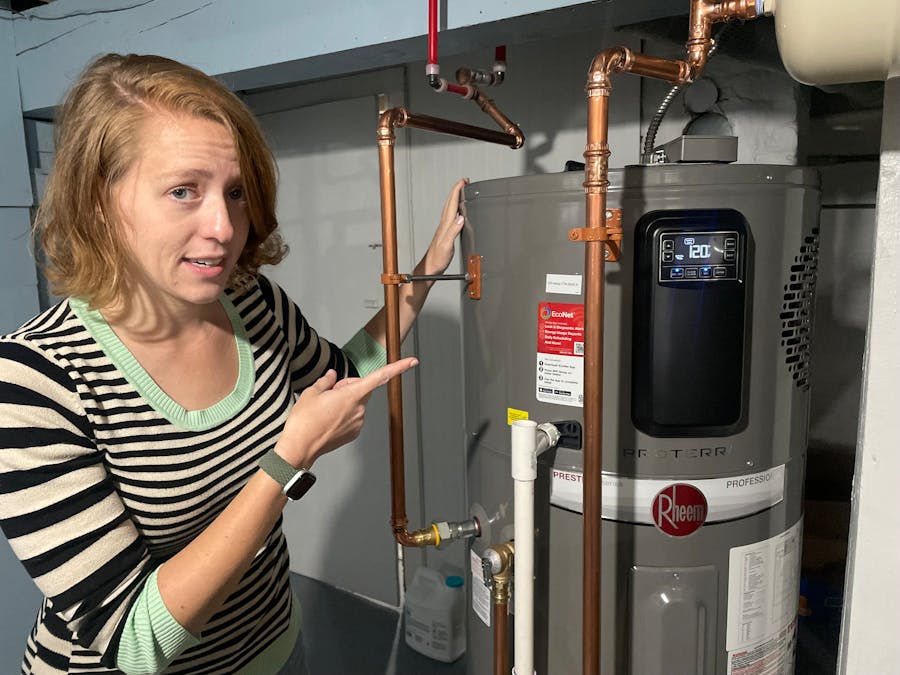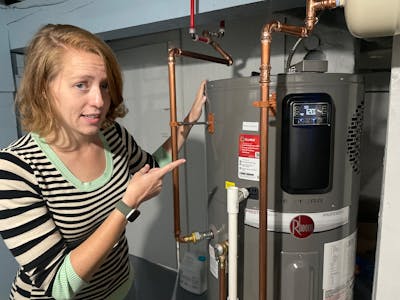JJenny Hoops, a runner, remembered jumping in her shower after a workout for the near-scalding flow of hot water she craves.
It was pitiful, she said. It was 50 degrees out. The shower was conking out. In the days to come, Hoops made a bold move.
For $5,400 she replaced her gas-fueled water heater with a model powered by an electric heat pump. The upgrade was her inaugural major climate action in the old stucco house the 29-year-old bought in St. Paul's Midway neighborhood.
"It was the first big thing I had to consider," Hoops said.
The new appliance put Hoops on the early front of a climate change energy revolution set for homes in Minnesota — and the rest of the country — with new financial help underway. Minnesota isn't following California's lead in considering banning gas furnaces and water heaters after 2030. But local interest in addressing the global warming crisis is growing, with the powerful rebates and tax cuts created by the federal 2022 Inflation Reduction Act helping people buy electric vehicles, switch out fossil fuel appliances, weatherize homes, install solar panels, and more.
YOUR CARBON FOOTPRINT
On this Earth Day, the Star Tribune offers a guide to the many ways you can take action today to reduce your carbon footprint.
Hoops immediately got a $400 rebate from Xcel Energy for her new 50-gallon Rheem Proterra Prestige series electric heat pump water heater. The heater was one of four options offered by St. Paul-based MSP Plumbing Heating Air. One of her neighbors had one, and sang its praises.
The new water heater sits in her open basement next to the furnace. She's thrilled with it.
Hoops, a medical librarian, said she had the money because during the pandemic she lived rent-free with her parents. That helped her pay a large down payment for the house for a decent mortgage. Plus, she lives cheaply. She doesn't drive a car, getting around on her bicycle instead.
"I'm a pretty aggressive saver," Hoops said.
Nationally, the shift to electric furnaces and water heaters is still small but "skyrocketing," said Eric Fowler, senior policy associate for buildings at the St. Paul-based nonprofit Fresh Energy. Heat pump water heater sales grew 26% nationally in 2022 and gas versions fell by 17%, he said, pointing to data collected by the New Buildings Institute.
With the debut of financial incentives, it's important to get projects organized, said Katie Jones, senior manager for community energy policy at the Twin Cities nonprofit Center for Energy and Environment.
"We do tell people once rebates are available, we anticipate contractors are going to be overrun," Jones said.
Weatherizing a house and installing an electric furnace together make up three-quarters of the potential reductions in greenhouse gases from a home, Jones said. The water heater is the second-largest appliance for change, representing about 10% of potential greenhouse gas reductions, or under about 1 metric ton of emissions per year, she said.
The Center for Energy and Environment's study last year concluded that doing everything to fully electrify one- to four-unit buildings — including insulating walls and attics, and getting appliances off fossil fuel — costs an average of about $31,000.
Heat pump water heaters pull in heat from surrounding air to warm the water using an evaporator, compressor and condenser. The electric heat pump water heaters dubbed "hybrid" automatically switch to a backup during heavy use, relying on "standard electric resistance heat," which is like a big toaster or space heater, to produce hot water. It's a different technology than the electric water heaters some homes have.
The Rheem water heater cost more than the other three options offered, Hoops said, but it moved her to a more sustainable lifestyle. She wanted energy savings, and called cutting her greenhouse gas emissions for the planet "a really wonderful bonus."
Plus, the appliance from the Atlanta-based manufacturer is getting her off natural gas, which she said she doesn't want because she had a traumatic gas-line leak experience as a child.
She was 9, she said, when her family was visiting her great aunt in California. During a dinner party, someone smelled gas. Everyone had to leave the house immediately, and fire trucks came and confirmed the leak. She remembered her mother crying. They had to move to someone else's house for the rest of the stay, she recalled.
Hoops realized she did not want gas in her home.
Hoops said she wouldn't describe herself as an environmentalist but is sympathetic.
"I think this was the first time I went more out of my way to choose a greener option," she said.
She moved to Minnesota from Indiana, Hoops said, where she was less interested in green energy. People seem more invested in the environment here, she said.
"Coming here, I kind of had my mind and options expanded," she said. "I'm hoping to have a family here."
In December, Hoops woke up to a cold house. Now her furnace was on the fritz. She decided to go full heat pump. This time, she financed the $20,000 cost of a heat-pump furnace and will pay it off over 10 years. When she filed her taxes, she got credits worth $2,625 for the furnace and water heater.
She loves her new technology, but she hopes the major appliance upgrades can stop for a while.
Earn cash back by converting your heating or hot water system to a heat pump
Get up to $2,000 back from a federal tax credit. Xcel Energy also offers rebates of $400 to $500 for new heat pump water heaters and hundreds or thousands of dollars for heat pump heating systems.
Rebate programs from the federal and state governments worth thousands more are expected in 2025.
Reporter Jennifer Bjorhus is currently on leave. If you would like to get in contact with an editor regarding this story, contact James Shiffer at james.shiffer@startribune.com.











